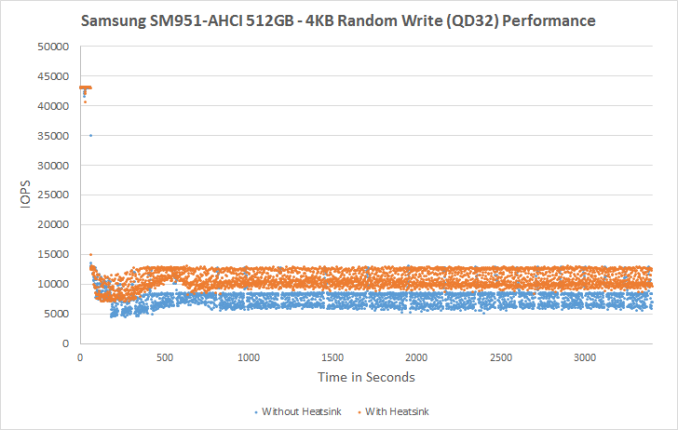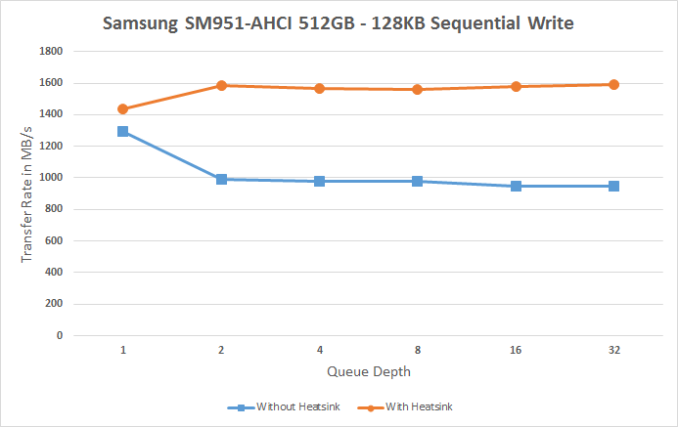Samsung SM951-NVMe (256GB) PCIe SSD Review
by Kristian Vättö on June 25, 2015 9:40 AM ESTThermal Throttling Revisited
When we first tested the SM951-AHCI in February, I noted that the drive seems to be suffering from thermal throttling when subjected to sustained workloads, especially sequential writes. I promised to run tests with a heatsink attached to see what the performance would be without any thermal limitations and now I have some results to present.
For these tests I used the stock 512GB SM951-AHCI and borrowed the M.2 to PCIe adapter with a heatsink from Plextor's M6e Black Edition. Unfortunately I had to send my M6e samples back before I could test the SM951-NVMe, but the purpose of these tests is more to show the impact of thermal throttling in actual client workloads rather than demonstrate the maximum peak performance.
| Samsung SM951-AHCI 512GB Performance | |||
| With Heatsink | Without Heatsink | Performance Delta | |
| The Destroyer (Data Rate) | 471.53MB/s | 455.65MB/s | -3.4% |
| The Destroyer (Latency) | 1323.6µs | 1388.4µs | -4.9% |
| Heavy (Data Rate) | 802.42MB/s | 802.17MB/s | 0.0% |
| Heavy (Latency) | 180.26µs | 181.39µs | -0.6% |
| Light (Data Rate) | 1,250MB/s | 1,240MB/s | -1.0% |
| Light (Latency) | 69.08µs | 69.19µs | -0.2% |
It's clear that the impact of thermal throttling in real world workloads is insignificant. In a worst case scenario where the drive is under a heavy IO workload the performance loss can be 5%, but in anything less intensive the difference is within the margin of error. Even though we truncate idle times to 25µs, it's enough to lighten the workload and reduce thermal throttling compared to a sustained synthetic workload.
Under a sustained 4KB random write workload the difference is more significant as without the heatsink the SM951-AHCI averages 7,878 IOPS, whereas the heatsink bumps that up to 10,873 IOPS.
The same goes for sequential write where throttling is evident and even more significant compared to the random write workload. Without the heatsink the SM951 can sustain peak throughput for about two minutes, which may not sound long but at 1.5GB/s that would translate to 180GB of data written and obviously such massive transfers are very rare.
To sum things up, there is no need to worry about thermal throttling under typical client workloads. There won't be any notable performance loss unless you subject the drive under an intensive sustained workload, which may be relevant to some professional users (e.g. high-end video editing), but not for the typical enthusiast and power user. If you want to ensure that your SM951 operates at full performance at all times, it's not a bad idea to get an adapter with a heatsink, but there is no loss in running the drive without one.












74 Comments
View All Comments
bill.rookard - Thursday, June 25, 2015 - link
CentOS (Actually, RH6.5 and newer) are supposed to have in the box storage drivers for NVME. It apparently doesn't follow the same naming convention (/dev/sdx) since it doesn't utilize the SCSI protocols, but the NVME protocols.So - to check before you buy?
#modinfo nvme - should list if your kernel has built in nvme support.
if you have a drive in, check if an nvme drive is in there and is recognized
#lspci | grep nvme
SofS - Thursday, June 25, 2015 - link
Indeed, but my point was about their quality and how they compare between each other.der - Thursday, June 25, 2015 - link
10th comment!bernstein - Thursday, June 25, 2015 - link
i guess the 1tb 840 msata had either too slim margins or wasn't popular enough...still waiting for a 1tb M2 NVMe drive...
foxtrot1_1 - Thursday, June 25, 2015 - link
See you in December 2016, then.bernstein - Friday, June 26, 2015 - link
obviously i was wrong since there also is an 1tb msata 850 evo.... now i am very curious as to why samsung doesn't have a 1tb M2 ssd!!!Kristian Vättö - Friday, June 26, 2015 - link
Because all the PCIe drives use MLC NAND, which is a lower capacity die.kspirit - Thursday, June 25, 2015 - link
The connector looks the same as that on the old SATA SSDs found in most laptops. I've got a 2280 sized Intel 1500 SSD in my HP Folio (Haswell). Would this give me PCIe speeds?foxtrot1_1 - Thursday, June 25, 2015 - link
No.Metaluna - Thursday, June 25, 2015 - link
Depends on whether HP hooked up the PCIe lanes on their M.2 connector, which I wouldn't assume without checking into it. The BIOS also needs to have NVMe support. In the most common configurations (i.e. the "B" and "M" keyings), M.2 is required to carry both SATA and 2-4 PCIe lanes, but some motherboard vendors routinely violate this and leave out one or the other. Asus drops the SATA on some of their higher-end Z97 motherboards, for example, so you can't rule out that someone else may have made the opposite tradeoff.